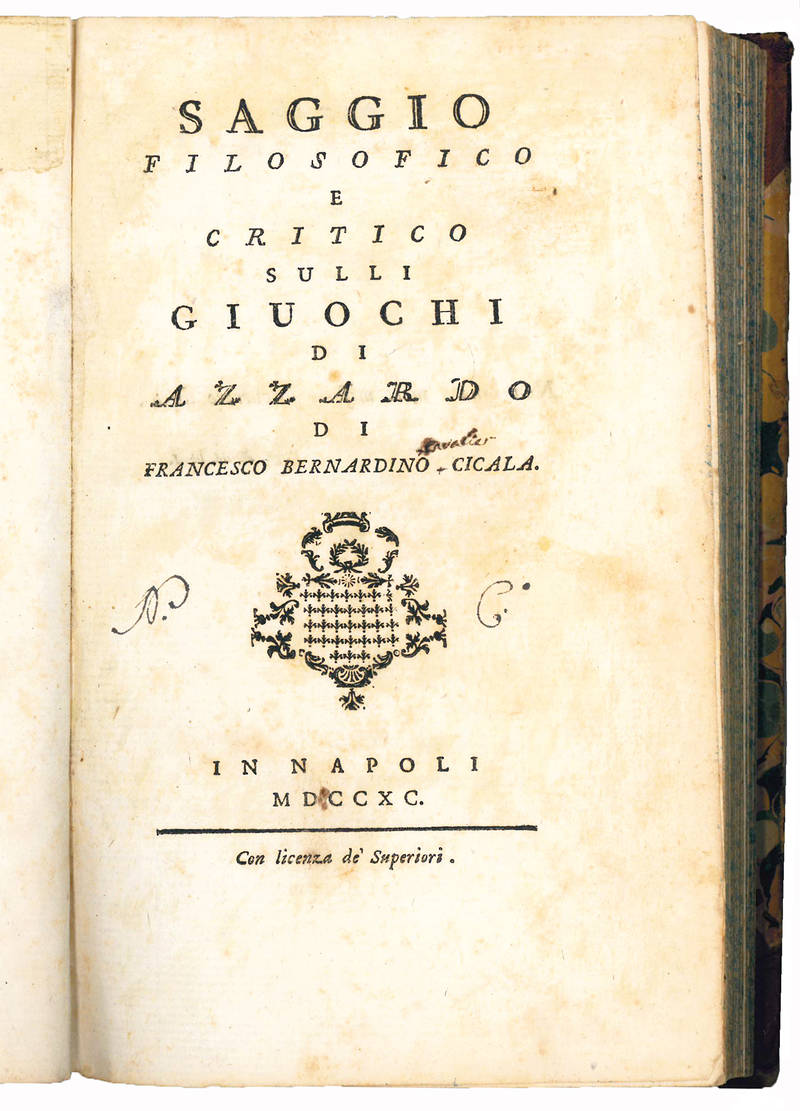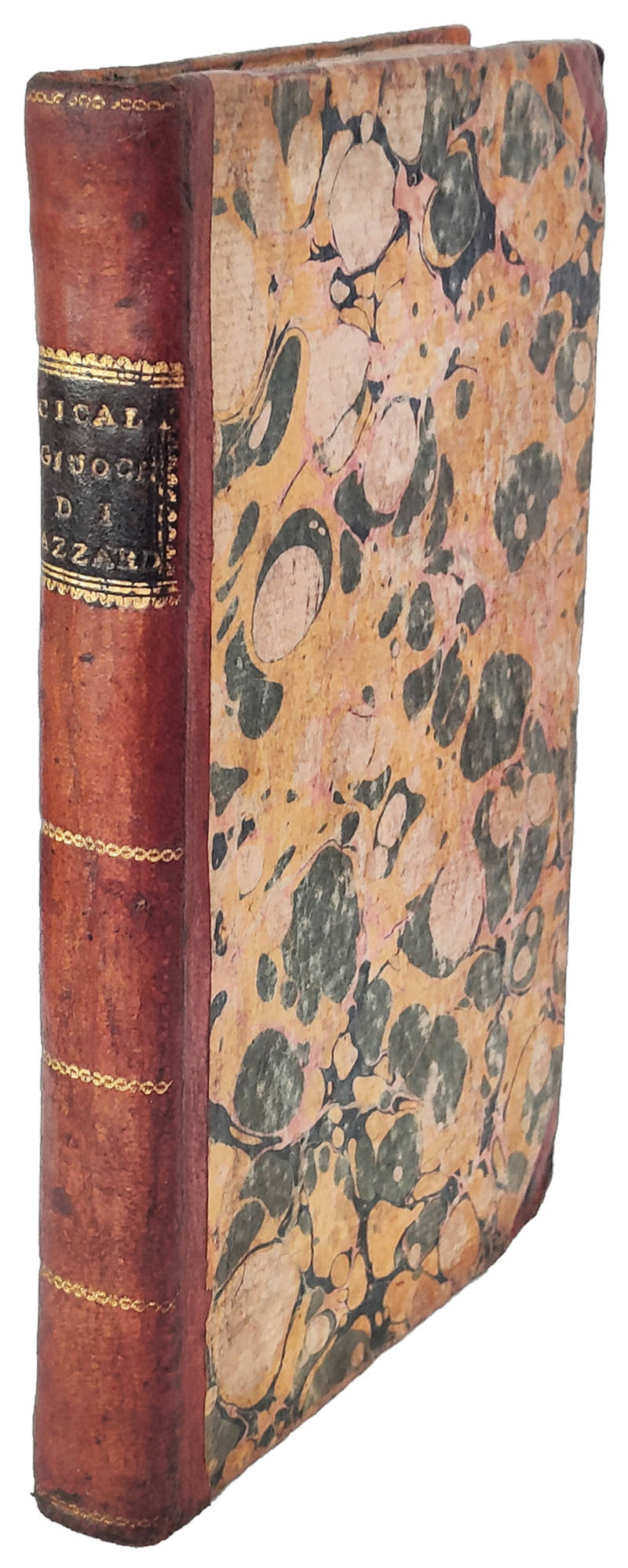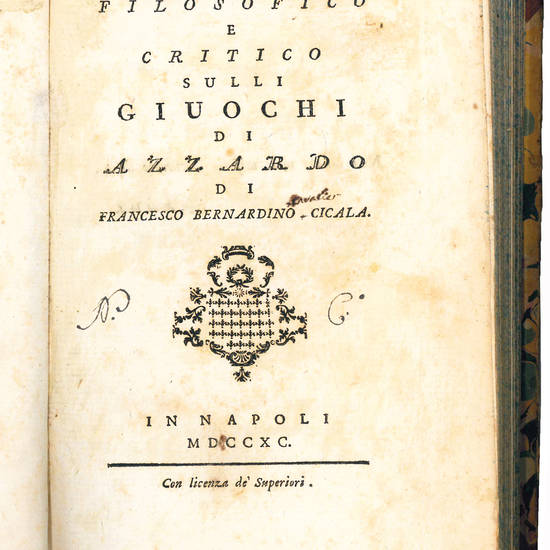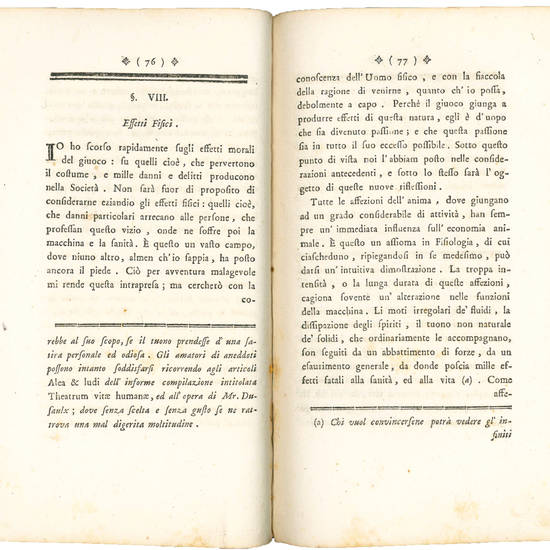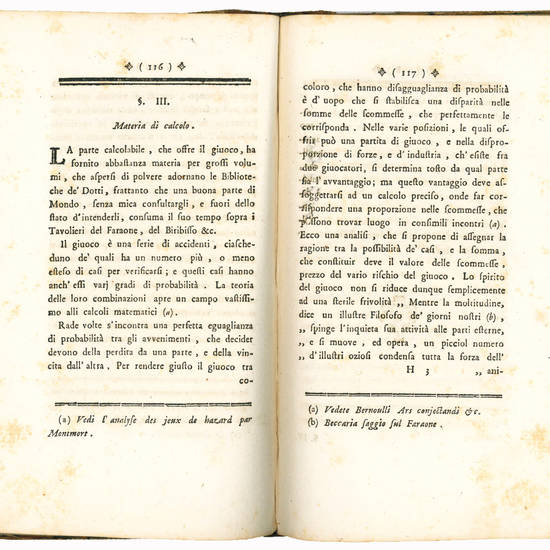ON GAMBLING
8vo (205x 127 mm). VIII, 232, [4] pp. The first leaf, a blank, is included in the pagination. The name of the printer can be found in the printing license at the end of the volume. Typographic ornament on the title page. Decorative head- and tailpieces. Contemporary half calf, gilt spine with lettering piece, marbled boards, sprinkled edges (some minor restoration to spine and corners). On the title page manuscript initials “N.C.”. Contemporary manuscript note at p. 39. Some scattered foxing due to the quality of the paper, all in all a good, genuine copy.
Rare first edition, dedicated by the author to John Acton (1736-1811), commander of the navy of the Kingdom of Naples, of this work dealing with gambling from every possible angle: mathematical, statistical, ethical, economical, legal, psychological, and social.
In 1790, at the age of twenty-five, Francesco Bernardino Cicala published in Naples the Saggio filosofico e critico sulli giuochi di azzardo, echoing in its title another work on the same subject by P.R. Montmort (Essai d'analyses sure les jeux de hazard, Paris, 1708). The treatise is not a mere examination of mathematical operations, but a series of insights on gambling interpreted in the context of human action and from a historical perspective. The author does not hide his personal involvement, having personally known the gambling tables. His personal experience acquires, however, through introspective analyses a public dimension. Indeed, the self-inquiry broadens to include groups, social classes and the entire nation. Gambling is investigated not only as an individual issue, but also in its collective dimension. The spreading of gambling is seen as a political problem to be dealt with through the critical lenses of the rationalist culture of the Enlightenment.
The Saggio consists of two sections, each comprising eight chapters: Human Sensibility, The Passion for the Game, Moral Effects, Consequences, Vicious Habits, Address to the Beautiful Sex, Time, its Use and Abuse, Physical Effects, Origins, Subject of Disputes, Matter of Calculation, Political Aims, Theory of Justice, Legislation, Law of Proscription, Linguet on Examination.
In addition to the usual classical and Christian authors, quotations from French, German and English thinkers are particularly numerous in the work: J. De la Bruyère, F. de la Rochefoucauld, H. Grotius, Cl.-A. Helvetius, S. Pufendorf, Ch.-L. Montesquieu, D. Diderot, F.-M. Voltaire, J.J. Rousseau, P.L. Maupertuis, É. Condillac, J. Locke, and W. Balckstone. Significant are also the references to Italian Enlightenment philosophers like A. Genovesi, G. Filangieri and C. Beccaria, remembered for his article on gambling published in the journal “Il Caffè”.
In describing the physical effects of gambling, Cicala achieves a remarkable effectiveness by using with confidence his medical knowledge of the functioning of the human organism. Ethical-philosophical reflections, on the other hand, intersect with mathematical theories and the calculus of probability. Cicala is well aware of the latest scientific-mathematical achievements in this field, and quotes Montmort, Bernoulli and Moivre.
Cicala also does not forget the role of women in gambling, providing an in-depth analysis of individual male and female behaviors. For Cicala gambling concerns both sexes, but he feels the need to directly addresses the female audience traditionally excluded from the debate of ideas. Concluding his analysis, Cicala also assesses the positive and recreational aspects of gambling if practiced in moderation, considering gambling as permissible when it creates healthy conditions of recreation and sociability that are positive both for the individual and the community (cf. E. Filieri, Francesco Bernardino Cicala 1765-1815, tra passione e ragione: il gioco d'azzardo nella pubblica armonia, in: “Il Canone e la Biblioteca, costruzioni e decostruzioni della tradizione letteraria italiana”, A. Quondam, ed., Rome, 2002, II, pp. 353-360).
When he wrote the present work, Cicala was a young man of 25, living in Naples at a time when gambling was a defining moment in society life. He had been for years very sensitive to both social gatherings and the passion for gambling. When he wrote the essay he had long avoided the now hated gambling tables: for him they had become only places to stay away from, because they evoked in him atmospheres and memories of a pathology that were still too vivid in his memory. It is precisely this pathology and the states of mind associated with it that Cicala analyzes in detail, with a particular attention to the interpersonal and social fallout of the gambler's behaviors. Cicala is at the same time a man of his time and a forerunner of a knowledge that was not yet widespread scientific patrimony at his time. His interpretation of the compulsion for gambling is no more in moralistic terms, but rather in the broader framework of ethics, medicine and psychic introspection. He goes beyond his time by separating the cultural and social dimension of gambling from the individual dimension of the gambler (F.B. Cicala, Il gioco d'azzardo. Saggio filosofico e critico sulli giuochi di azzardo, G. Corrivetti & M.R. Pelizzari, eds., Cava de' Tirreni, 2006, pp. 11-18).
Francesco Bernardino Cicala, born in Lecce in 1765, began writing at a very young age. At 20 he had already composed two tragedies, Marcantonio in Egitto (which remained unpublished) and Gli Arsacidi, which was successfully performed in Naples, replicated in various Italian cities and first published in 1789. His tragedies also include Merope, La dinastia degli Eraclidi, Meride, Erode (remained unpublished), and Ermione, first performed in 1797 and published in 1798. Admitted, at only 22, to the Academy of Arcadia under the name Melindo Alitreo, at 27 he was accepted into the Royal Academy of Sciences and Fine Letters in Naples. He was also a member of the Accademia del Buon Gusto in Palermo and the Accademia dei Pastori Ereini-Imerei. Most of his poems and tragedies were published in the two volumes of the Opere (Lecce, 1814). In 1799 Cicala joined the Republic of Naples. When the Bourbons returned, he was imprisoned for two years, then forced to flee outside the kingdom. Returning home with the arrival of the Napoleonids, he settled in Lecce, where he died in 1815.
Italian Union Catalogue, IT\ICCU\SBLE\007592.
[11517]

